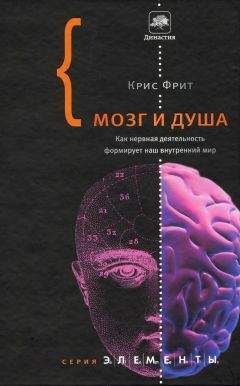Алекс Ликерман - Непобедимый разум. Наука о том, как противостоять трудностям и невзгодам
185
Blackledge J., Hayes S. Emotion Regulation in Acceptance and Commitment Therapy // Psychotherapy in Practice, 2001. Vol. 57. P. 243–255.
186
Flynn J., Hollenstein T., Mackey A. The Effect of Suppressing and Not Accepting Emotions on Depressive Symptoms: Is Suppression Different for Men and Women? // Personality and Individual Differences, 2010. Vol. 49. P. 582–586.
187
Roemer L., Orsillo S., Salters-Pedneault K. Efficacy of an Acceptance-Based Behavior Therapy for Generalized Anxiety Disorder: Evaluation in a Randomized Controlled Trial // Journal of Consulting and Clinical Psychology, 2008. Vol. 76. P. 1083–1089.
188
Blackledge J., Hayes S. Emotion Regulation in Acceptance and Commitment Therapy // Psychotherapy in Practice, 2001. Vol. 57. P. 243–255.
189
Twohig M., Hayes S., Masuda A. Increasing Willingness to Experience Obsessions: Acceptance and Commitment Therapy as a Treatment for Obsessive-Compulsive Disorder // Behavior Therapy, 2006. Vol. 37. P. 3–13.
190
Forman E. et al. An Open Trial of an Acceptance-Based Behavioral Intervention for Weight Loss // Cognitive and Behavioral Practice, 2009. Vol. 16. P. 223–235.
191
Gifford E. et al. Acceptance-Based Treatment for Smoking Cessation // Behavior Therapy, 2004. Vol. 35. P. 689–705.
192
Lundgren T., Dahl J., Hayes S. Evaluation of Mediators of Change in the Treatment of Epilepsy with Acceptance and Commitment Therapy // Journal of Behavioral Medicine, 2008. Vol. 31. P. 225–235.
193
Blackledge J., Hayes S. Emotion Regulation in Acceptance and Commitment Therapy // Psychotherapy in Practice, 2001. Vol. 57. P. 243–255.
194
Berkowitz D. On the Reclaiming of Denied Affects in Family Therapy // Family Process, 1977. Vol. 16. P. 495–501; Mawson D. et al. Guided Mourning for Morbid Grief: a Controlled Study // British Journal of Psychiatry, 1981. Vol. 138. P. 185–193.
195
Jordan J., Neimeyer R. Does Grief Counseling Work? // Death Studies, 2003. Vol. 27. P. 765–786.
196
Davis C. et al. Searching for Meaning in Loss: Are Clinical Assumptions Correct? // Death Studies, 2000. Vol. 24. P. 497–540.
197
Davis C. et al. Searching for Meaning in Loss: Are Clinical Assumptions Correct? // Death Studies, 2000. Vol. 24. P. 497–540.
198
Davis C. et al. Searching for Meaning in Loss: Are Clinical Assumptions Correct? // Death Studies, 2000. Vol. 24. P. 497–540.
199
Davis C. et al. Searching for Meaning in Loss: Are Clinical Assumptions Correct? // Death Studies, 2000. Vol. 24. P. 497–540.
200
Silver R., Boon C., Stones M. Searching for Meaning in Misfortune: Making Sense of Incest // Journal of Social Issues, 1983. Vol. 39. P. 81–102.
201
Davis C. et al. Searching for Meaning in Loss: Are Clinical Assumptions Correct? // Death Studies, 2000. Vol. 24. P. 497–540.
202
Lichtenthal W., Cruess D. Effects of Directed Written Disclosure on Grief and Distress Symptoms Among Bereaved Individuals // Death Studies, 2010. Vol. 34. P. 475–499.
203
Lowey S. Letting Go Before a Death: a Concept Analysis // Journal of Advanced Nursing, 2008. Vol. 63. P. 208–215.
204
Davis C. et al. Searching for Meaning in Loss: Are Clinical Assumptions Correct? // Death Studies, 2000. Vol. 24. P. 497–540.
205
Diener E., Lucas R., Scollon C. Beyond the Hedonic Treadmill: Revising the Adaptation Theory of Well-Being // American Psychologist, 2006. Vol. 61. P. 305–314.
206
Гилберт Д. Спотыкаясь о счастье. Думаешь, ты знаешь, что делает тебя счастливым? СПб.: Питер Пресс, 2008.
207
Davis C. et al. The Undoing of Traumatic Life Events // Personality and Social Psychology Bulletin, 1995. Vol. 21. P. 109–124.
208
Davis C. et al. The Undoing of Traumatic Life Events // Personality and Social Psychology Bulletin, 1995. Vol. 21. P. 109–124.
209
Watkins P. et al. Taking Care of Business? Grateful Processing of Unpleasant Memories // The Journal of Positive Psychology, 2008. Vol. 3. P. 87–99.
210
Gilbert P., Procter S. Compassionate Mind Training for People with High Shame and Self-Criticism: Overview and Pilot Study of a Group Therapy Approach // Clinical Psychology and Psychotherapy, 2006. Vol. 13. P. 353–379.
211
Gilbert P., Procter S. Compassionate Mind Training for People with High Shame and Self-Criticism: Overview and Pilot Study of a Group Therapy Approach // Clinical Psychology and Psychotherapy, 2006. Vol. 13. P. 353–379.
212
Akelaitis A. Studies on the Corpus Callosum: IV. Diagnostic Dyspraxia in Epileptics Following Partial and Complete Section of the Corpus Callosum // The American Journal of Psychiatry, 1945. Vol. 101. P. 594–599.
213
Gilbert P., Procter S. Compassionate Mind Training for People with High Shame and Self-Criticism: Overview and Pilot Study of a Group Therapy Approach // Clinical Psychology and Psychotherapy, 2006. Vol. 13. P. 353–379.
214
Sbarra D., Smith H., Mehl M. When Leaving Your Ex, Love Yourself: Observational Ratings of Self-Compassion Predict the Course of Emotional Recovery Following Marital Separation // Psychological Science, 2012. P. 261–269.
215
Neff K., Kirkpatrick K., Rude S. Self-Compassion and Adaptive Psychological Functioning // Journal of Research in Personality, 2007. Vol. 41. P. 139–154.
216
Calderwood K. Adapting the Transtheoretical Model of Change to the Bereavement Process // Social Work, 2011. Vol. 56. P. 107–118.
217
Fredrickson B. et al. What Good Are Positive Emotions in Crises? a Prospective Study of Resilience and Emotions Following the Terrorist Attacks on the United States on September 11th, 2001 // Journal of Personality and Social Psychology, 2003. Vol. 84. P. 365–376.
218
Fredrickson B., Levenson R. Positive Emotions Speed Recovery from the Cardiovascular Sequelae of Negative Emotions // Cognition and Emotion, 1998. Vol. 12. P. 191–220.
219
Fredrickson B. et al. What Good Are Positive Emotions in Crises? a Prospective Study of Resilience and Emotions Following the Terrorist Attacks on the United States on September 11th, 2001 // Journal of Personality and Social Psychology, 2003. Vol. 84. P. 365–376.
220
Fredrickson B. et al. What Good Are Positive Emotions in Crises? a Prospective Study of Resilience and Emotions Following the Terrorist Attacks on the United States on September 11th, 2001 // Journal of Personality and Social Psychology, 2003. Vol. 84. P. 365–376.
221
Fredrickson B. et al. What Good Are Positive Emotions in Crises? a Prospective Study of Resilience and Emotions Following the Terrorist Attacks on the United States on September 11th, 2001 // Journal of Personality and Social Psychology, 2003. Vol. 84. P. 365–376.
222
Tugade M., Fredrickson B. Regulation of Positive Emotions: Emotion Regulation Strategies That Promote Resilience // Journal of Happiness Studies, 2007. Vol. 8. P. 311–333.
223
Peterson C. et al. Strengths of Character, Orientations to Happiness, and Life Satisfaction // The Journal of Positive Psychology, 2007. Vol. 2. P. 149–156.
224
Peterson C. et al. Strengths of Character, Orientations to Happiness, and Life Satisfaction // The Journal of Positive Psychology, 2007. Vol. 2. P. 149–156.
225
Wood A., Froh J., Geraghty A. Gratitude and Well-Being: a Review and Theoretical Integration // Clinical Psychology Review, 2010. Vol. 30. P. 890–905.
226
Wood A., Froh J., Geraghty A. Gratitude and Well-Being: a Review and Theoretical Integration // Clinical Psychology Review, 2010. Vol. 30. P. 890–905.
227
Wood A. et al. Gratitude Influences Sleep Through the Mechanism of Pre-Sleep Cognitions // Journal of Psychosomatic Research, 2009. Vol. 66. P. 43–48.
228
Lau R., Cheng S.-T. Gratitude Lessens Death Anxiety // European Journal of Ageing, 2011. Vol. 8. P. 169–175.
229
Wood A., Froh J., Geraghty A. Gratitude and Well-Being: a Review and Theoretical Integration // Clinical Psychology Review, 2010. Vol. 30. P. 890–905.
230
Roese N. The Functional Basis of Counterfactual Thinking // Journal of Personality and Social Psychology, 1994. Vol. 66. P. 805–818.
231
Taylor S. Adjustment to Threatening Events: a Theory of Cognitive Adaptation // American Psychologist, 1983. Vol. 38. P. 1161–1173.
232
Roemer L., Borkovec T. Effect of Suppressing Thoughts About Emotional Material // Journal of Abnormal Psychology, 1994. Vol. 103. P. 467–474.
233
Davis C. et al. The Undoing of Traumatic Life Events // Personality and Social Psychology Bulletin, 1995. Vol. 21. P. 109–124.
234
Канеман Д. Думай медленно… решай быстро. М.: АСТ, 2013.
235
Koo M. et al. It’s a Wonderful Life: Mentally Subtracting Positive Events Improves People’s Affective States, Contrary to Their Affective Forecasts // Journal of Personality and Social Psychology, 2008. Vol. 95. P. 1217–1224.
236
Wood A., Froh J., Geraghty A. Gratitude and Well-Being: a Review and Theoretical Integration // Clinical Psychology Review, 2010. Vol. 30. P. 890–905.
237
Koo M. et al. It’s a Wonderful Life: Mentally Subtracting Positive Events Improves People’s Affective States, Contrary to Their Affective Forecasts // Journal of Personality and Social Psychology, 2008. Vol. 95. P. 1217–1224.
238
Koo M. et al. It’s a Wonderful Life: Mentally Subtracting Positive Events Improves People’s Affective States, Contrary to Their Affective Forecasts // Journal of Personality and Social Psychology, 2008. Vol. 95. P. 1217–1224.
239
Taylor S. Adjustment to Threatening Events: a Theory of Cognitive Adaptation // American Psychologist, 1983. Vol. 38. P. 1161–1173.
240
Frias A. et al. Death and Gratitude: Death Reflection Enhances Gratitude // The Journal of Positive Psychology, 2011. Vol. 6. P. 154–162.
241
Frias A. et al. Death and Gratitude: Death Reflection Enhances Gratitude // The Journal of Positive Psychology, 2011. Vol. 6. P. 154–162.
242
D’Argembeau A., van der Linden M. Individual Differences in the Phenomenology of Mental Time Travel: The Effect of Vivid Visual Imagery and Emotion Regulation Strategies // Consciousness and Cognition, 2006. Vol. 15. P. 342–350.
243
Schroevers M., Kraaij V., Garnefski N. Cancer Patients’ Experience of Positive and Negative Changes Due to the Illness: Relationships with Psychological Well-Being, Coping, and Goal Reengagement // Psycho-Oncology, 2011. Vol. 20. P. 165–172.
244
Peterson C. et al. Strengths of Character, Orientations to Happiness, and Life Satisfaction // The Journal of Positive Psychology, 2007. Vol. 2. P. 149–156.
245
Sprecher S., Fehr B. Enhancement of Mood and Self-Esteem as a Result of Giving and Receiving Compassionate Love // Current Research in Social Psychology, 2006. Vol. 11. P. 227–242.
246
Marcel G. Man Against Mass Society. South Bend, IN: St. Augustine’s Press, 2008. P. 117.
247
Hofmann S., Grossman P., Hinton D. Loving-Kindness and Compassion Meditation: Potential for Psychological Interventions // Clinical Psychology Review, 2011. Vol. 31. P. 1126–1132.
248
Schwartz C., Sendor M. Helping Others Helps Oneself: Response Shift Effects in Peer Support // Social Science and Medicine, 1999. Vol. 48. P. 1563–1575.
249
Schwartz C., Sendor M. Helping Others Helps Oneself: Response Shift Effects in Peer Support // Social Science and Medicine, 1999. Vol. 48. P. 1563–1575.
250
Brown S. et al. Coping with Spousal Loss: Potential Buffering Effects of Self-Reported Helping Behavior // Personality and Social Psychology Bulletin, 2008. Vol. 34. P. 849–861.
251
Brown S. et al. Coping with Spousal Loss: Potential Buffering Effects of Self-Reported Helping Behavior // Personality and Social Psychology Bulletin, 2008. Vol. 34. P. 849–861.
252
Weinstein N., Ryan R. When Helping Helps: Autonomous Motivation for Pro-Social Behavior and Its Influence on Well-Being for the Helper and Recipient // Journal of Personality and Social Psychology, 2010. Vol. 98. P. 222–244.
253
Weinstein N., Ryan R. When Helping Helps: Autonomous Motivation for Pro-Social Behavior and Its Influence on Well-Being for the Helper and Recipient // Journal of Personality and Social Psychology, 2010. Vol. 98. P. 222–244.
254
Isen A., Levin P. Effect of Feeling Good on Helping: Cookies and Kindness // Journal of Personality and Social Psychology, 1972. Vol. 21. P. 384–388.
255
Isen A., Levin P. Effect of Feeling Good on Helping: Cookies and Kindness // Journal of Personality and Social Psychology, 1972. Vol. 21. P. 384–388.
256
Toegel G., Anand N., Kilduff M. Emotion Helpers: The Role of High Positive Affectivity and High Self-Monitoring Managers // Personnel Psychology, 2007. Vol. 60. P. 337–365.




